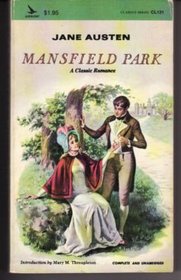Helpful Score: 1
Not her best, but very, very good. Much more simple and much less belle, if such a thing is possibly true.
Jane Austen's sweeping tale of the coming of age of Fanny Price, a poor girl sent to live with wealthy relations.
This may be Jane Austen's most controversial book - readers ask, is Fanny Price too good, too pious, too much of a doormat? Yes, of course she is. But she's grown on me over the years and with each reading of this wonderful, cynical, wise book.
This is not the best Austen out there, but still a fun read.
Wonderful Jane Austen. Good plot and great characters.
Not as exciting as Pride and Prejudice, but very readable and beautifully written.
Not Jane Austen's best work, but identifiably hers. She wrote this when young and her lack of polish as an author shows through, but the plot is predictably Austen. The themes---moral good vs evil, persons of substance vs the vapid--are also Austen through and through, as are the characters who feature in this tale of a country family torn by adultery and dishonor. If you've read another Austen and love her, then I recommend this, but don't make this one your first exposure to the joy that is a Jane Austen novel.
This edition in particular was really wonderful. From the notes in the back, the introduction, and the appendix, this is how classics should be published.
What red-blooded American woman doesn't like Jane Austin? Her use of language and development of characters is outstanding. Mansfield Park is one of her lesser acclaimed novels, but this is still an incredible novel. The audio book is read well by Maureen O'Brien. The whole experience made my morning commute something to look forward to!
LOVE EVERYTHING JANE AUSTEN !!
How can you improve on the characters and conversation of Jane's ??
How can you improve on the characters and conversation of Jane's ??
It drags a bit in the middle, but picks up nicely for a very satisfying ending.
Mansfield Park has it all. Of course it has Austin's dexterous English, but it also has the social commentary of class and gender which we also expect from her. It has all the feel of a retrospective, and it is remarkable in the extreme that Austin saw her own world with eyes so very like our own. If the quintessence of the creative writer's craft is the development and maintenance of tension, then this is the quintessential Austin novel, and possibly her best. We ache for Fanny when she is transported from her home as a young girl and fails to find either comfort or happiness in the manor house of her aunt and uncle. We are as edgy as the characters themselves as they mount a home theatrical production which places in relief each of their deficiencies, and foretells the guileless decency of our young protagonist. Our nerves are as knotted as hers when the scheming and fabulously wealthy Crawford stalks her, brandishing matrimony as a weapon. And even as we are turning the final dozen pages, the faulty judgment of Fanny's love interest, her cousin Edmond, instills lingering doubts as to whether a satisfying outcome is achievable. Let me provide a preview of Austin's delicious language and the underlying tension it conveys: "The evening passed with external smoothness, though almost every mind was ruffled, and the music which Sir Thomas called for from his daughters helped to conceal the want of real harmony." And here Austin portrays the controlling male mindset in dealing with their female marionettes: "In thus sending her away, Sir Thomas perhaps might not be thinking merely of her health...he might mean to recommend her as a wife by showing her persuadableness." And just how depraved is Mr. Crawford? "Curiosity and vanity were both engaged, and the temptation of immediate pleasure was too strong for a mind unused to make any sacrifice to right...he could not bear to be thrown off by the woman whose smiles had been so wholly at his command; he must exert himself to subdue so proud a display of resentment; it was anger on Fanny's account [for rebuffing him]; he must get the better of it, and make Mrs. Rushworth Maria Bertram [her maiden name] again in her treatment of himself." In Mansfield Park, we have pure evil in a position of commanding power, pitted against a powerless angel. And one by one, the angel's natural allies line up against her. There are a hundred paths to disaster, and only one to the sweetest victory.
- Ralph White
- Ralph White




